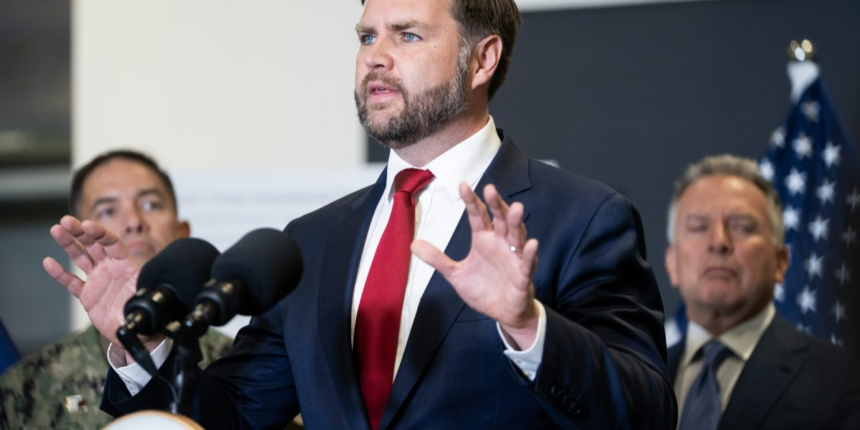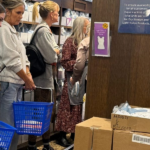Vice President JD Vance said Tuesday he believes U.S. military members will be paid at the end of the week, though he did not specify how the Trump administration will reconfigure funding as pain from the second-longest shutdown spreads nationwide.
“We do think that we can continue paying the troops, at least for now,” Vance told reporters after lunch with Senate Republicans at the Capitol. “We’ve got food stamp benefits that are set to run out in a week. We’re trying to keep as much open as possible. We just need the Democrats to actually help us out.”
The vice president reaffirmed Republicans’ strategy of trying to pick off a handful of Senate Democrats to vote for stopgap funding to reopen the government. But nearly a month into the shutdown, it hasn’t worked. Just before Vance’s visit, a Senate vote on legislation to reopen the government failed for the 13th time.
The strain is building on Democratic lawmakers to end the impasse. That was magnified by the nation’s largest federal employee union, which on Monday called on Congress to immediately pass a funding bill and ensure workers receive full pay. Everett Kelley, president of the American Federation of Government Employees, said the two political parties have made their point.
“It’s time to pass a clean continuing resolution and end this shutdown today. No half measures, and no gamesmanship,” said Kelley, whose union carries considerable political weight with Democratic lawmakers.
“We’ve got to get a deal with Donald Trump,” Kaine said.
But shutdowns grow more painful the longer they go. Soon, with closures lasting a fourth full week as of Tuesday, millions of Americans are likely to experience the difficulties firsthand.
“This week, more than any other week, the consequences become impossible to ignore,” said Rep. Lisa McClain, chair of the House Republican Conference.
Vance said that reconfiguring funds for various programs such as SNAP was like “trying to fit a square peg into a round hole with the budget.”
The Agriculture Department says the contingency fund is intended to help respond to emergencies such as natural disasters. Democrats say the decision concerning the Supplemental Nutrition Assistance Program, known as SNAP, goes against the department’s previous guidance concerning its operations during a shutdown.
Senate Democratic leader Chuck Schumer of New York said the administration made an intentional choice not to the fund SNAP in November, calling it an “act of cruelty.”
U.S. District Judge Susan Illston granted a preliminary injunction that bars the firings while a lawsuit challenging them plays out. She had previously issued a temporary restraining order against the job cuts that was set to expire Wednesday.
Federal agencies are enjoined from issuing layoff notices or acting on notices issued since the government shut down Oct. 1. Illston said that her order does not apply to notices sent before the shutdown.
At the Capitol, congressional leaders mostly highlighted the challenges many Americans are facing as a result of the shutdown. But there was no movement toward negotiations as they attempted to lay blame on the other side of the political aisle.
“Now government workers and every other American affected by this shutdown have become nothing more than pawns in the Democrats’ political games,” said Senate Majority Leader John Thune, R-S.D.
But the Senate has consistently fallen short of the 60 votes needed to advance that spending measure. Democrats insist that any bill to fund the government also address health care costs, namely the soaring health insurance premiums that millions of Americans will face next year under plans offered through the Affordable Care Act marketplace.
When asked about his strategy for ending the shutdown, Schumer said that millions of Americans will begin seeing on Saturday how much their health insurance is going up next year.
“People in more than 30 states are going to be aghast, aghast when they see their bills,” Schumer said. “And they are going to cry out, and I believe there will be increased pressure on Republicans to negotiate.”
Republicans insist they will not entertain negotiations on health care until the government reopens.
___
Associated Press writers Lisa Mascaro and Joey Cappelletti in Washington and Marc Levy in Harrisburg, Pennsylvania, contributed to this report.









